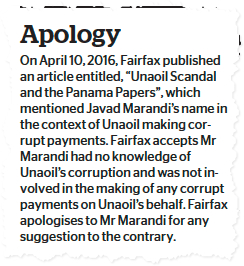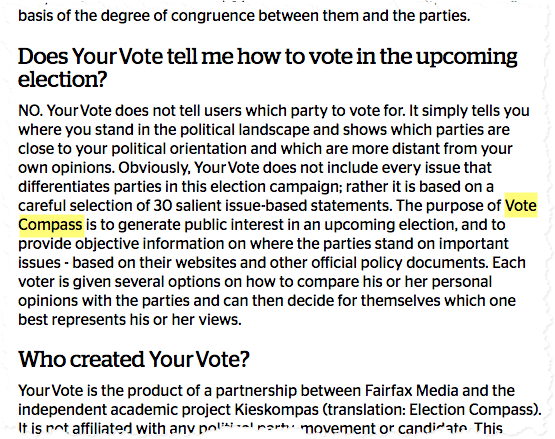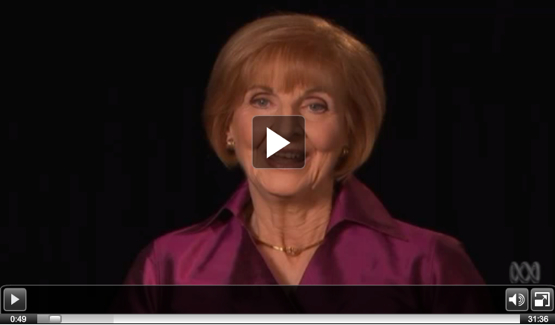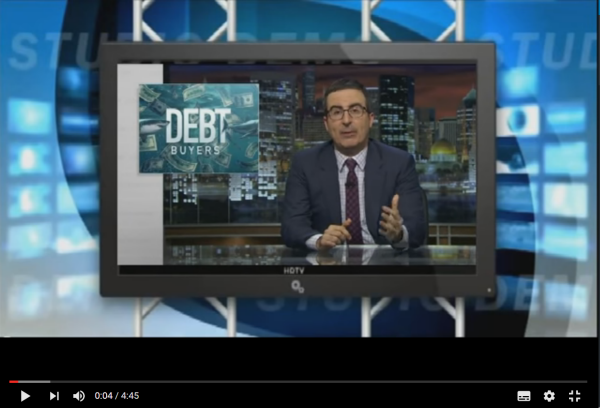Australian Story turns 20. It’s anniversary show explores the program’s unique approach, its highs and lows, and the criticisms and benefits that come with letting people tell their story sympathetically …
Tory donor gets apology. Today’s Fairfax papers carry an apology to Javad Marandi, a major Tory donor in the UK the papers had accused of being involved in Unaoil’s Azerbaijan operation, based on emails that showed payments being made to someone called “Javad”. An article making these allegations has since been removed.
In today’s apology, Fairfax states that it “accepts Mr Marandi had no knowledge of Unaoil’s corruption and was not involved in the making of any corrupt payments on Unaoil’s behalf”.

Fairfax’s Unaoil investigation implicated Western companies and many of the world’s most powerful people for involvement in bribing third-world officials for access to resources. It has come under criticism from The Australian, which revealed Fairfax’s investigation came at the same time someone called “Komrade” tried to extort the Ahsani family, which owns Unaoil, for US$5 million worth of bitcoins. — Myriam Robin
A win for News. After taking a US$280 million write-off and loss in the third quarter caused by the settlement of a court case against it, News Corp will be able to book its share of a US$130 million settlement in its favour from a legal action against rival digital property group Zillow. In an announcement this morning, Zillow said it had settled the lawsuit with News, News’ online property group Move, and the National Association for Realtors. Move had sued Zillow for trade secret theft over its hiring of two former Move execs and had claimed US$2 billion in damages. Zillow lost an important ruling last month on key parts of its defence. The case was due to go to trial overnight, our time. The realtors’ association will be entitled to 10% of the settlement (US$13 million), with Move (News Corp) getting the remainder (US$117 million). That will help boost fourth-quarter earnings and partially offset the $280 million loss from earlier in the year. — Glenn Dyer
By the numbers. American newspapers stopped charting their own sales and revenue declines in 2014 when the usual quarterly updates on ad revenues, and the half-yearly reports on circulations, were abandoned. When that happened (no announcement was made, the updates just stopped appearing), total ad revenues had plunged from US$60 billion in 2001 to around US$19 billion in 2014. All sorts of excuses have been trotted out, but it is plain to see that the flood of bad news about falling print sales and revenues overwhelmed owners and management, so the updates stopped.
But there is one measure which continues to be updated and that is media employment data from the US Bureau of Labor Statistics (which produces the monthly jobs report and associated analysis). Last Thursday it published its latest assessment of media employment trends, and the look is not good for newspapers, book publishing, radio and magazines. But there was good news for all things online, social media, video and movies. Employment in internet publishing and online broadcasting rose from about 30,000 to nearly 198,000 between 1990 and March this year and now exceeds employment in newspapers. What really stands out is the surge from 2008 onwards in this sector when employment was around 80,000. That’s a rise of 147% in eight years.
But it’s the size of the fall in newspaper employment that is startling — the drop was from 458,000 in 1990 to around 183,000 in March of this year. That is a fall of around 275,000 people. And US colleges and universities continue to churn out thousands of graduates from their journalism and media courses each year! — Glenn Dyer
Your Vote Compass. Fairfax’s Your Vote has certain similarities to the ABC’s Vote Compass. In fact, whoever wrote the FAQ seems to have momentarily gotten the two mixed up, which the ABC’s Matt Liddy (editor of interactive digital storytelling) quickly noticed …

Tronc! Tronc! Out of the way! No wonder Tribune Publishing pushed out is renaming and new strategy only hours after the annual meeting last Thursday in Chicago (it is going to be called “Tronc” from June 20, a decision to have brought almost universal derision). Tribune of course is under siege from Gannett, America’s biggest print publisher, which has a US$15-a-share offer on the table. Gannett had urged shareholders to oppose the re-election of some of the board at the Tribune AGM including CEO Justin Dearborn and chairman and major shareholder Michael Ferro. Tribune claimed Gannett had failed in its call, claimed that accurate voting figures would take time to become available and pushed ahead with the renaming and update on the new business strategy (which didn’t really mention publishing newspapers).
Overnight, Monday those voting figures were revealed in an SEC filing by Tribune and shocked punters with news that 41% of shareholders had withheld support for the board. Ferro received 59% support from shareholders, and his hand-picked CEO, Justin Dearborn, received 58.58%. But if the shares owned by Ferro and his Merrick Media co-investors are taken out of the vote, five of the eight failed to win 50%, including Ferro and Dearborn. Normally, in the US, directors are re-elected on votes of 90% or more (but not lately at News Corp, where there has been strong shareholder opposition to the Murdoch clan and some other directors).
As a result, shares in Tribune Publishing jumped more than 17% to just over US$13, still well short of the Gannett offer of US$15 a share. Gannett said through a spokesman that it was still re-evaluating its offer, but other reports suggested the company would press on. — Glenn Dyer
Video of the day. John Oliver forgives the debt of 9000 people.









John Oliver’s ‘stunt’ is excellent – he doubled Oprah’s car give-away munificence. This is good TV.
Hmm, the Big Issue & Oz Story, its twinset & pearls equivalent, are both 20 years old. That’s generally deemed to be a generation.
Tempus bloody Fugit.
United States of WTF? Trump, Clinton and Debt as a commodity?